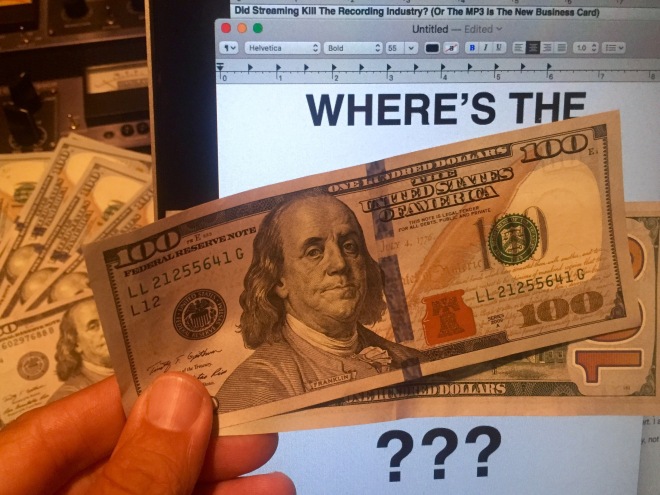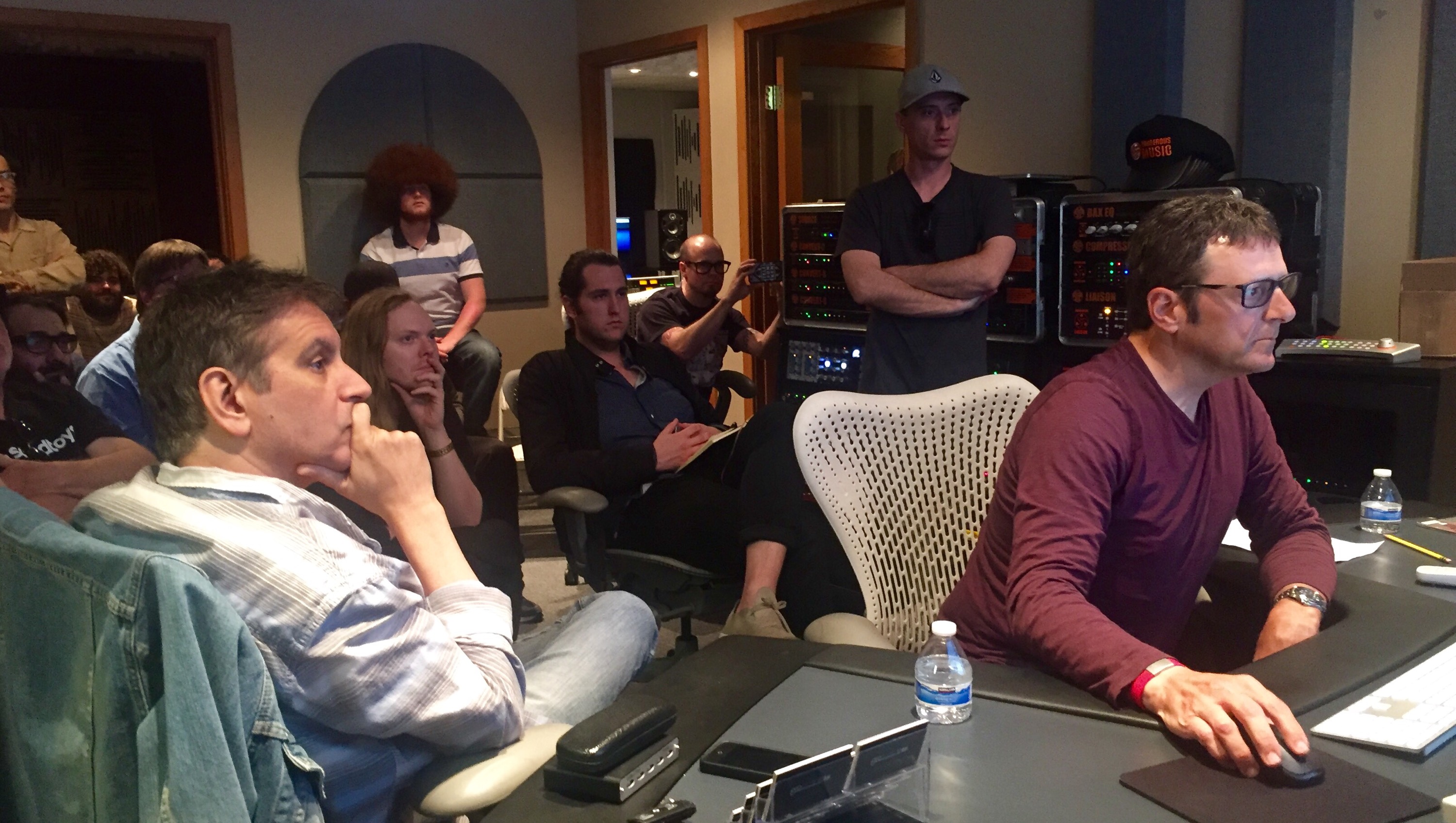First of all, the record business is not dead. It’s different. But hey, the world is different, thanks in part to the Internet. It may look burned to a crisp from the outside, but, like a toasted campfire marshmallow, there’s good stuff hidden just beneath the surface.
With respect to music and artistry, truly committed recording artists, i.e. those who have a sense of purpose more profound than making (or copping) a fashion statement, will continue to record and release great music, with or without financial reward. They cannot help it, because they are driven artists to the core. These artists are releasing some of the best music I’ve heard over the course of my 35 year career in the biz. I mix a lot of indie records these days, and I can sincerely say that I rarely have an intolerable day at work. Frankly, most days are exciting, fun and enjoyable. I can’t say the same about the years when my work was mostly for major labels.
So, if the overall quality of the music—at least that which crosses my desk—is higher, why are we concerned about the record business? Because many artists and composers are not being paid fairly for their work, which can eventually cause enough financial stress to incentivize creators to stop creating new art. Just this week Rob Chiarelli and I met with Robert Fink, the Chair of UCLA’s Music Industry program, and had an interesting discussion related to this. Rob recounted speaking at another university, where his audience was half middle-aged faculty and half 20-something students. When he asked how many people believed that consumption of recorded music should be free, 80% of the crowd raised their hands. Fink then rhetorically posed the question, “Should the musicians who perform on records be paid for their services?” We assume that any reasonable person would emphatically declare, “Of course!”
Needless to say, the math simply doesn’t add up. But there is indeed great new music from new artists waiting to be discovered, so music lovers will continue to have a steady flow of new content to consume, right?
Frankly, I don’t know. I hope so, but, given the free-for-all nature of the Internet, it is much more difficult to actually find and discover the “great” new recording artists.
A byproduct of the manifestation of the much heralded promise of a level playing field (on which every artist would have an equal shot at success) was the loss of many major label “curators” who actively sought and developed talent while sticking to acts who were in line with their own, often peculiar, personal tastes. Like them or not, A&R personnel served a vital function with respect to growing the record business. A&R folks during the glory days of AOR (Album Oriented Rock) signed acts who they actually liked and believed in, often based on intangibles like emotional resonance and…wait for it…hunches. For the most part, they stuck to what they knew and loved.
The more recent trend has been to sign acts based on quantifiable numeric milestones, which may include indie sales, streams, downloads and other tangibles that fit neatly onto a spreadsheet or P&L. Hit a magic number, get a record deal—regardless of your new label’s passion for your product…oops, I meant music. I suppose that attitude makes sense on one level, but it doesn’t account for the emotional factor. Think about it: a Steely Dan fan might not get Jay Z any more than a 30 Seconds To Mars fan would feel John Denver or Ethel Merman. Every new artist needs a champion at the label. I’ve seen A&R folks go to the mat for their beloved artists when poor sales numbers did not reflect the intangible emotional resonance that accompanied an act. On the other side of the coin, it would be tough to champion a band that was the equivalent of a disposable paper cup to a label where there is an imbalance of artistic v. bottom line concerns—especially if you don’t even relate to the band’s music!
For a new major label artist, the pressure is on to have an immediate hit. Indie artists, however, can take longer, even years, to score, provided the funding well doesn’t run dry. Circling back to the title of this article, both major and indie artists are getting the shaft with respect to payouts for streaming, but there is more to the story. Labels are making money, even if digital piracy is ubiquitous. Artists and writers? Let’s just say that they better love music enough to create it even if they don’t get paid to do so…because they probably won’t. Streaming, along with downloading and theft, has cut into the revenue formerly produced by physical (CD) sales. This is clearly bad news for indies on the rise because they need every penny they can get, right?
Here’s where you get to lambast me. As much as I personally want to get paid fairly for my intellectual property, I personally want people to stream my music.
The record business is the new Wild West, a semi charted frontier that will see new ventures open for business as each town along the trail to the promised land establishes itself. Opportunities will present themselves in response to the demands of the people. We artists may stubbornly believe that we’ll continue to earn a living based on our record sales, but the times are a-changin’. There are plenty of revenue streams in the record business, but for new indie artists and non marquee major label artists, royalties from streaming and sales of downloads simply will not keep the raft afloat.
One partial solution is to identify and nurture SuperFans. From this subset of fans, you may (if you are lucky) find your own twelve apostles who will spread your gospel far and wide. In my case, I engage them with special content (like my blog or the master classes and seminars that I do in the Los Angeles area) to develop a genuine rapport. I also empower them by giving them mp3s to stream and or share, because the mp3 is my new business card.
A business card is designed to say, “Hey, check out me! Look what I can do for you!” They are to be given away, not sold. Try to imagine this conversation:
You: “Do you have a card?
Service provider: “Of course! Here you go…”
You: “Terrific! May I have another five for my friends?”
Service provider: “Sure! Thanks for spreading the word. That’ll be $5, please.”
You: [Crickets.]
The way I see it, the service provider just blew an opportunity. For a recording artist service provider, this would have been a big deal because it can be hard enough to get one person to listen to your music, let alone six! With so many options available to the listener, the artist must find a way to stand out from the background noise. In this case, there were six prospects (including you and potentially a coveted SuperFan) who were prequalified by you, because you already knew that their tastes in music intersected with this particular artist’s work. Plus you lend credibility to the referral by virtue of simply making the referral to your trusted friends.
The reality is that good new music almost immediately gets ripped and uploaded to YouTube the day it is released. Even Prince wasn’t able to control that reality. So my attitude is to focus on the opportunity rather than the injustice.
As an example, my 2015 album Marchesano is available via the usual delivery portals like iTunes, Bandcamp, and CD Baby. Bandcamp offers the option to unlock the limited number of free streams before the customer (read: potential fan) is required to either purchase the music or to listen to something else—which implies going someplace else. In the virtual marketplace, I never want to oust a customer from the shop–he/she places absolutely no burden on my resources. It’s not like I have my staff attending to this person, so I have nothing to lose. Let’s assume that this customer is in fact a cheap bastard who intends to stream my album a million times without ever paying for it. That’s great! I made the music for people to enjoy, plus El Cheapo may want to stream my music for friends (maybe even a future SuperFan) who are willing to support recording artists by buying their music and merchandise. I will never penalize anybody who wants my music to be part of the soundtrack to their lives.
Check this out: I have no control over iTunes’ pricing and presentation of Marchesano, but I can customize the presentation on Bandcamp. It has definitely and quantifiably made a positive difference. My artistic vision was to present the songs in the context of a concept album that chronicles a journey along a spiritual path. Therefore, I wanted to sell, or stream, the entire album. Bandcamp allowed me to refrain from selling individual songs, so I set the price at “$15 or more” for the entire thematically connected album. (iTunes forces the price to $0.99 per song, and, as a further insult, does not include the PDF booklet, which is integral to my vision of the artistic presentation.) My customers on Bandcamp pay “more” nearly 50% of the time. For some unknown reason, $22 is a popular price, and some folks have paid $50 for a download! I shit you not.
My personal, unique Bandcamp experience tells me that some music lovers are willing to support artists whose music resonates with them. Not everybody bases their purchasing decisions solely on price, so there is no real need to perpetuate the race to the bottom by fixing prices at roughly a buck per song while the cost of living continues to increase as wages stay the same for middle-class Americans.
The upshot of all this is that streaming is not inherently bad. It helps me develop a fan base at a grass roots level, and provides an easy way for new listeners to decide for themselves whether or not they want to take the next step, which can lead to any number of profit centers for me. Even if somebody steals an mp3, they will have the opportunity to purchase high definition wav files, a physical CD, licensing, my services as a producer/mixer/guitarist, or the fashionably questionable T-shirts I hope to foist on the world. Add to that humble list the revenue from live show ticket sales and merchandise for touring artists, whose fans want to take home a memento of a special evening shared with good friends and good music. Long story short, the record biz is a different beast than it was ten years ago, but there is plenty of opportunity for smart industrious types who see it for what it is, not for what it was.
As a parting thought, publisher/manager Jan Seedman offers some wisdom: “Musicians and those in the industry appreciate music fans who actually buy the music. This covers more than one area: 1) These fans don’t get enough credit for helping to support the music industry. They have become an elite group. 2) By acknowledging these fans, you are subtly sending a message to others that maybe non-paying fans should get on board and get off of “music welfare.” 3) It’s an opportunity to introduce the idea of Music Supporter/Fan Appreciation Day (or whatever you want to call it). Like Record Store Day, it’s an opportunity to acknowledge real music fans/supporters, even for one day. For MS/FAD, maybe suggest when a customer purchases music at full price on that day, he/she gets something else thrown in as a way of saying thanks.”












